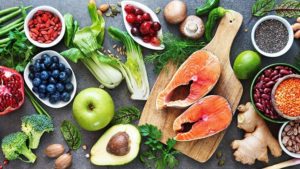
One of the most common questions people with arthritis ask is, “Is there a special arthritis diet?” While there’s no miracle diet for arthritis, fortunately, many foods can help fight inflammation and improve joint symptoms.
For starters, a diet rich in fruits, vegetables, fish, nuts and beans but low processed foods and saturated fat, is not only great for overall health, but can also help manage disease activity. The Mediterranean diet is frequently touted for its anti-aging and disease-fighting powers.
Studies confirm that eating foods commonly part of the Mediterranean diet can lower blood pressure; protect against chronic conditions like cancer and stroke; help arthritis by curbing inflammation; benefit your joints as well as your heart; lead to weight loss, which can lessen joint pain.
Here are key foods from the Mediterranean diet:
· Fish – recommend three to four ounces of fish, twice a week. Arthritis experts claim more is better. Fish oil helps to reduce joint swelling and pain, duration of morning stiffness and disease activity among people who have rheumatoid arthritis
Best sources: Salmon, tuna, sardines, herring, anchovies, scallops and other cold-water fish. Or take 600 to 1,000 mg of fish oil daily eases joint stiffness, tenderness, pain and swelling.
· Nuts & Seeds – Eat 1.5 ounces of nuts daily (one ounce is about a handful).
It was found that that over a 15-year period, men and women who consumed the most nuts had a 51% lower risk of dying from an inflammatory disease.
And though they’re relatively high in fat and calories, studies show noshing on nuts promotes weight loss because their protein, fiber and monounsaturated fats are satiating. But more is not always better.”
Best sources: Walnuts, pine nuts, pistachios and almonds.
· Fruits & Veggies – Aim for nine or more servings daily. Fruits and vegetables are loaded with antioxidants, which act as the body’s natural defense system, helping to neutralize unstable molecules called free radicals that can damage cells. Research has shown that anthocyanins found in cherries and other red and purple fruits like strawberries, raspberries, blueberries and blackberries have an anti-inflammatory effect. Citrus fruits – like oranges, grapefruits and limes – are rich in vitamin C. Vitamin K-rich veggies like broccoli, spinach, lettuce, kale and cabbage dramatically reduces inflammatory markers in the blood.
Best sources: Colorful fruits and veggies – the darker or more brilliant the color, the more antioxidants it has. Good ones include blueberries, cherries, spinach, kale and broccoli.
· Olive Oil: Two to three tablespoons daily. Olive oil is loaded with heart-healthy fats, as well as oleocanthal. Oleocanthal inhibits activity of COX enzymes, with a pharmacological action similar to ibuprofen,” says Ordovás. Inhibiting these enzymes dampens the body’s inflammatory processes and reduces pain sensitivity.
Best sources: Extra virgin olive oil. Avocado and safflower oils have also shown cholesterol-lowering properties, while walnut oil has 10 times the omega-3s that olive oil has.
· Beans – About one cup, twice a week (or more). Beans are loaded with fiber and phytonutrients, which help lower CRP, an indicator of inflammation found in the blood. Beans contain a host of antioxidant and anti-inflammatory compounds. They are also inexpensive.
Best sources: Small red beans, red kidney beans and pinto beans.
· Whole grains – Eat six ounces of grains per day; at least three of which should come from whole grains. One ounce of whole grain would be equal to ½ cup cooked brown rice or one slice of whole-wheat bread.
Whole grains contain plenty of filling fiber, which can help you maintain a healthy weight and lower blood levels.
Best sources: Foods made with the entire grain kernel, like whole-wheat flour, oatmeal, bulgur, brown rice and quinoa. Be aware that gluten, a protein found in wheat and other grains, has been linked to inflammation for people with celiac disease (CD) or gluten sensitivity.
· Nightshade Vegetable – These include eggplant, tomatoes, red bell peppers and potatoes, which are disease-fighting powerhouses that boast maximum nutrition for minimal calories. They also contain solanine, a chemical that has been branded the culprit in arthritis pain. There’s no scientific evidence to suggest that nightshades trigger arthritis flares. So, if you notice that your arthritis pain flares after eating them, consider eliminating all nightshade vegetables from your diet for a few weeks to see if it makes a difference.


